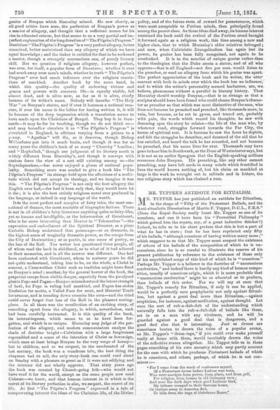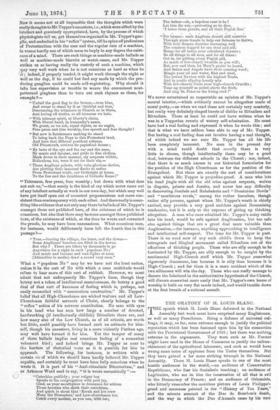MR. TUPPER'S ANTIDOTE FOR RITUALISM.
Al-R. i TUPPER has just published an antidote for Ritualism,
n the shape of "Fifty of the Protestant Ballads, and the Anti-ritualistic Directorium of Martin F. Tupper, D.C.L., F.R.S." (Does the Royal Society really boast Mr. Tupper as one of its members, and can it have been his "Proverbial Philosophy" which gained him the repute, say, of a great inductive thinker?) Indeed, he tells us in his short preface that this is but a part of what he has in store ; that he has here reprinted only fifty of his ballads, "although conscious of having written many more ;" which suggests to us that Mr. Tupper must suspect the existence of others of his ballads of the composition of which he is un- conscious, since he is so careful to illustrate the reserve of his present publication by reference to the existence of those only of his unpublished songs of this kind of which he is "conscious."
Perhaps Mr. Tupper is a. believer in the doctrine of "unconscious cerebration," and indeed there is hardly any kind of human compo- sition, usually of conscious origin, which it is more probable that "unconscious cerebration" might be so educated as to produce, than ballads of this order. For we will say at once that Mr. Tupper's remedy for Ritualism, if only it can be applied, would be a perfectly sure prophylactic not only against Ritual- ism, but against a great deal more than Ritualism,—against scepticism, for instance, against meditation, against thought. Let once 'the sort of rub-a-dub-dub of the understanding which naturally falls into the rub-a-dub-dub of ballads like these, set in on a man with any virulence, and he will be guarded against a good deal that is dangerous, and a
good deal also that is interesting. Just as drums are sometimes beaten to drown the voice of a popular orator, so Mr. Tupper's "drum-taps," if you could ever make yourself really at home with them, would inevitably drown the voice of the reflective reason altogether. Mr. Tupper tells us in these pages something of his own ancestry which may partly account for the ease with which he produces Protestant ballads of which he is conscious, and others, perhaps, of which he is not con- scious :—
" For I come from the stock of confessors myself,
Cif a Protestant house before Luther was born, Who wore martyrs from power, from place, and from pelf, For religion, from homes in old Germany torn ; And near the dark days when good Latimer bled, My fathers escaped to their Sarnian home,
Or further away to America fled,
To hide from the rage of idolatrous Rome."
Now it seems not at all impossible that the thoughts which were really thoughts to Mr.Tupper's ancestors, i.e., which were sifted by the intellect and genuinely appropriated, have, by the process of which physiologists tell us, got themselves organised in Mr. Tupper's gan- glia, and embodied in his "reflex" system, till he spins off professions of Protestantism with the ease and the regular rate of a machine, in verses hardly one of which seem to imply in any degree the exist-
ence of a mind. There are such things as machine-made ballads as well as machine-made biscuits or watch-cases, and Mr. Tupper
strikes us as having really the custody of such a machine, which stpay very well work when he is not conscious as hard as when he
; indeed, if properly tended, it might work through the night as well as the day, if he could but find any mode by which the pro- ducing ganglion could be made self-registering. Why should it take less supervision or trouble to weave the commonest neat- patterned gingham than to turn out such rhymes as these, for example ?—
" Unfurl the good flag to the breeze,—true blue,
And swear to stand by it as 'faithful and true,' Denouncing the trimmers in Church as in State, And loving all truths, as all treasons we hate.
"With tolerant spirit, at liberty's claim, With liberal hand, in-humanity's name, We grant, as we ask, equal rights, as we ought, Free press and free worship, free speech and free thought !
"But now is Intolerance making its stand To bring back the Pope to this Protestant land, And here that illiberal pestilent scheme, Old Priestcraft, revives its papistical dream ; "By lusts of the eye and the ear and the nose, By music and incense, and pride in fine clothes, Meek doves in their manner, sly serpents within, Ridiculous, too, were it not for their sin,— " These Anglican priests, with vain-glorions device, Are plotting their innocent flocks to entice From Protestant truth, our birthright at home, To the lies and the thraldoms of Catholic Rome I"
"Tolerance, free press, free worship ; but down with what does not suit us,"—that surely is the kind of cry which never came out of any intellect actually at work in our own day, but which may well have got itself spun out of ancestral prepossessions not more con- sistent than contemporary -with each other. And there really is some- thing like evidence that not only may there be ballads of Mr. Tupper's amongst those not published here, of the existence of which he is conscious, but also that there may be some amongst those published here, of the existence of which, at the time be wrote and corrected the proofs, he may have been unconscious. What conscious man, for instance, would deliberately have left the fourth line in this passage ?— " True,—leaving the village, the lanes, and the downs— Some Anglicans' benches are filled in the towns. But why ? There are idlers by thousands to go Anywhere for a sight in each populous No ;' And music and incense and wax-lights at noon (Attractive to moths) draw a crowd very soon."
What a "populous No" may be we have not the least notion, unless it be the sort of No with which a sane multitude would refuse to hear more of this sort of rubbish. However, we must admit that not unfrequently Mr. Tupper's lines, though they betray not a token of intellectual consciousness, do betray a good deal of that sort of keenness of feeling which is, perhaps, not easily reconciled with "unconscious cerebration." Mr. Tupper's belief that all High-Churchmen are wicked traitors and all Low- Churchmen faithful servants of Christ, clearly belongs to the " reflex " action of his nervous constitution. No man with eyes in his head who has seen how large a number of devoted, hardworking (if intellectually childish) Ritualists there are, and how many also of the Low Church, as of all schools, are worth but little, could possibly have formed such an estimate for him- self, though his ancestors, living in a more violently Puritan age, may well have formed it for him. Yet the temper of many of these ballads implies real conscious feeling of a somewhat vehement kind ; and indeed brings Mr. Tupper as near to the borders of rhetorical verse as it is possible for him to approach. The following, for instance, is written with a
certain vie of which we should have hardly believed Mr. Tupper
capable, and certainly he must have been fully conscioua when he wrote it. It is part of his "Anti-ritualistic Directoriutn," and as Artemus Ward used to say, "it is wrote sarcastically ":—
"Catechize publicly ; your vulgar boy Spouts to the congregation with pert joy, Glad, as your mouthpiece to denounce for schism Those heretics who shirk their catechism, And quick to shout that Korah and his crew Mean the Dissenters,' and Low-churchmen too. Catch every mother, as you can, with tea ;
The father--ah, a hopeless case is he I Let him die out,—protesting as he dies, 'I hates them priests, and all their Popish lies.'
"For hymns : each Anglican should still contrive Through pious frauds to help our Scheme to thrive, With holy Roman doctrine leavening well The common doggrel he can steal and sell.
Range for all tastes your calculated rhymes ; Be all things to all men, and for all times: Get in, for gilding every Popish pill, As much of low-church twaddle as you will; But, now and then, let Mary's praise be heard, And Saints and Angels have their cunning word; Mingle your oil and water, flint and steel, The lowest Newton with the highest Neale, And in poetic slipslop keenly mix With low-church Cross your high-church Crucifix ; Tune up yourself as priest above the flock, And sing St. Pater as the living rock 1"
We never entertained so respectable an opinion of Mr. Tupper's mental interior,—which evidently cannot be altogether made of moral putty,—as when we read these not certainly very masterly, but really very definitely shaped bursts of dislike to Ritualism and Ritualists. These at least he could not have written when he was in a Tupperian reverie of watery self-admiration. He must have had a real feeling and expressed it when he wrote this ; and that is what we have seldom been able to say of Mr. Tapper. But having a real feeling does not involve having a real thought, of which indeed we are sure Mr. Tapper has all his life been completely innocent. No man in the present day with a mind could doubt that morally there is very little to choose, though intellectually there may be a good deal, between the different schools in the Church ; nor, indeed, that there is as much excuse in our historical formularies for the position of the High Churchman as for the position of the Evangelical. But these are exactly the sort of considerations against which Mr. Tupper is prejudice-proof. A man who lets his head jingle with all the old cries against serpents, wolves in disguise, priests and Jesuits, and never has any difficulty in discovering Jezebels and Rabahakehs and "Dominican Devils" and "murderous revels," among the rather harmless, though rather silly persons, against whom Mr. Tupper's wrath is chiefly excited, may provide a very good antidote against Romanising tendencies, but it is only at the expense of giving up thinking altogether. A man who once admitted Mr. Topper's noisy rattle into his bead, would be safe against Anglicanism, but too safe also against things that are a great deal more valuable than Anglicanism,—for instance, anything approaching to intelligence and intellectual self-respect. The time for Mr. Tupper is past. There is no need now of any such child's drum to keep the retrograde and illogical movement called Ritualism out of the affections of thinking people. Those who are silly enough to be fascinated by Mr. Tupper, are silly enough to be caught by the sentimental High-Church stuff which Mr. Tupper somewhat vigorously denounces, less because it is silly than because it is High-Church ; and for them it is a mere accident which of the two sillinesses will win the day. Those who can really manage to discern the falsehood in the authoritative hypothesis of the Church, will discern somewhat more easily that Mr. Tupper's own house of worship is built on very flat sands indeed, and would tumble down at the first breath of a rational assault.



































 Previous page
Previous page